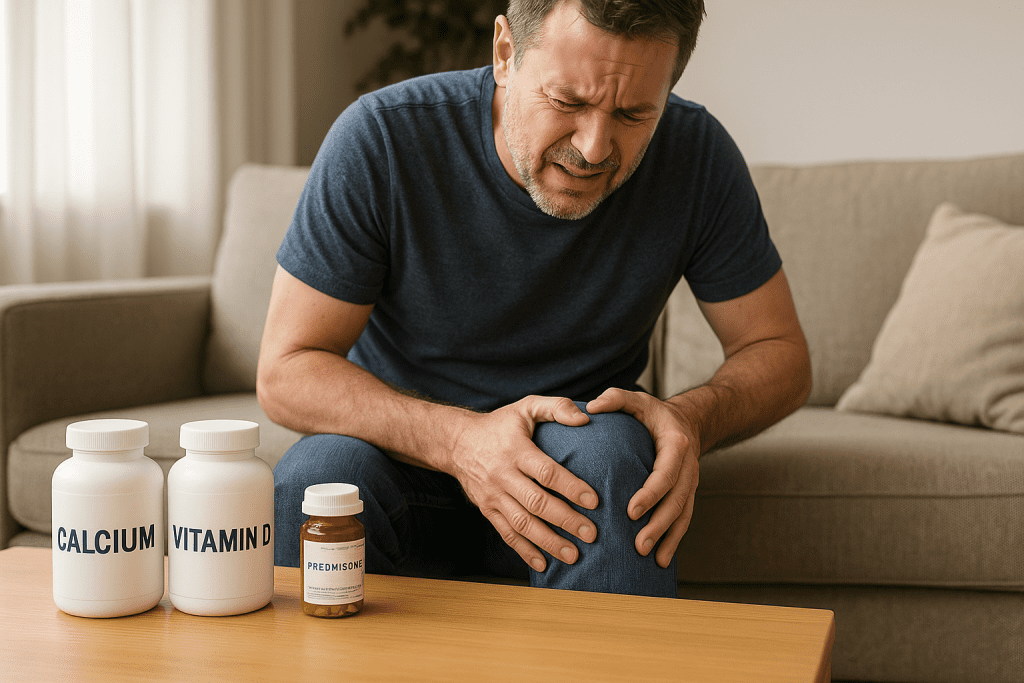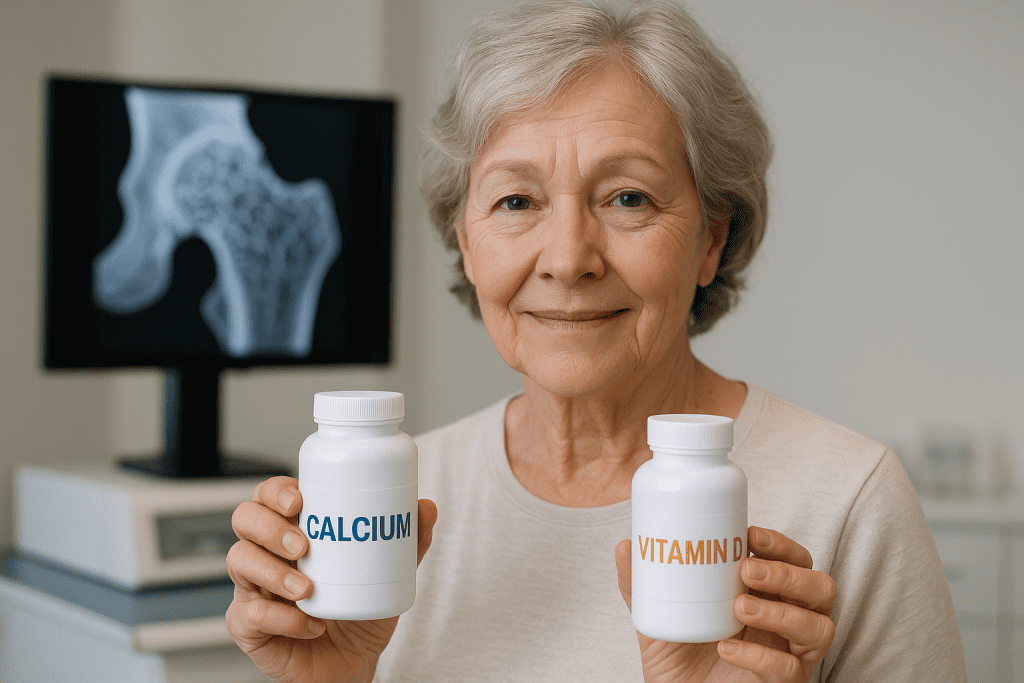Can calcium supplements worsen joint pain during steroid treatment, or are the steroids themselves to blame? This common concern arises among patients managing inflammatory conditions with long-term corticosteroids.
This article breaks down the connection between steroid therapy side effects, calcium and vitamin D supplementation, and joint or bone discomfort, helping you understand what really causes the pain and how to protect your bone health.
Summary / Quick Answer
Here’s what the science says about joint pain, calcium supplements, and steroids:
- Steroids, not calcium, are the primary cause of joint discomfort and bone loss
- Calcium with vitamin D helps prevent steroid-induced osteoporosis, not joint pain
- Studies show no link between calcium supplements and increased joint pain
- Joint symptoms are usually due to the underlying condition or steroid side effects
The best approach is to follow rheumatology guidelines: take calcium and vitamin D, monitor bone density, and work with your provider to manage steroid therapy.
How Steroids Impact Bone and Joint Health
Corticosteroids like prednisone are effective for inflammation, but long-term use comes at a cost. Their well-documented side effects include significant bone loss and increased risk of joint and muscle issues.

How Steroids Cause Bone Loss
Steroids disrupt the balance between bone formation and breakdown:
- Increase osteoclast activity, speeding up bone resorption
- Suppress osteoblasts and osteocytes, reducing bone-building capacity
- Lower calcium absorption in the gut
- Increase calcium excretion, leading to secondary hyperparathyroidism
This cascade leads to rapid bone loss, especially in the spine and forearms. Research shows that most bone loss occurs in the first 3–6 months of steroid therapy and continues steadily over time.
| Mechanism | Effect on Bone Health |
|---|---|
| Increased osteoclasts | Higher bone breakdown |
| Decreased osteoblasts | Lower bone formation |
| Gut calcium malabsorption | Weaker mineral supply |
| Urinary calcium loss | Further depletes calcium stores |
Joint and Muscle Weakness
Beyond bones, steroids can lead to muscle atrophy and joint instability:
- Steroid-induced myopathy presents as painless weakness in limbs
- Fall risk increases, elevating fracture risk
- Critical illness myopathy may develop in high-dose IV steroid scenarios
While steroids can reduce inflammatory joint pain in conditions like rheumatoid arthritis, they don’t treat the disease itself. Most rheumatologists use prednisone as temporary “bridge therapy”, not a long-term solution.
Learn more about managing steroid therapy from Cleveland Clinic.
Calcium and Vitamin D During Steroid Therapy

Steroid-induced osteoporosis is preventable – and calcium supplementation plays a major role.
What the Guidelines Say
According to the American College of Rheumatology, patients on glucocorticoids should take:
- 1,200–1,500 mg calcium per day
- 800–1,000 IU vitamin D daily
This combo supports mineral density and reduces the risk of vertebral fractures. However, a surprising number of patients don’t receive these preventative supplements.
Does Supplementation Work?
Yes – but only when calcium is paired with vitamin D.
A 2020 Cochrane review found that the combination prevents bone loss, especially in the spine. However, calcium alone isn’t as effective, and vitamin D is essential for absorption.
| Supplement | Effectiveness |
| Calcium + Vitamin D | ✓ Proven benefit for bone density |
| Calcium alone | ✗ Limited impact |
| Vitamin D alone | ✓ Supports calcium absorption |
Explore our list of certified interaction-safe multivitamins for polypharmacy to see which supplements meet these standards.
Do Calcium Supplements Cause Joint Pain?
This is a common fear, but medical research consistently shows that calcium supplements do not contribute to joint discomfort.
Clinical Evidence
One major NIH-funded trial followed thousands of women over two years. It found no difference in joint pain or swelling between those taking calcium plus vitamin D and those on a placebo:
- Joint pain frequency: 74.6% (supplement) vs. 75.1% (placebo)
- Joint swelling: 34.6% vs. 32.4%
Another study of postmenopausal women found similar results. Roughly 3 out of 4 participants reported joint pain, regardless of calcium intake.
The Exception: CPPD Arthritis
A separate condition called calcium pyrophosphate dihydrate (CPPD) arthritis involves calcium crystals in the joints. However:
- It’s not caused by supplementation
- Linked to aging and osteoarthritis, not calcium intake
Unless you’re taking extremely high doses, standard calcium supplements don’t lead to joint pain, especially when paired with vitamin D.
Rheumatology Approach: What Really Causes the Pain?
Rheumatologists emphasize that calcium helps preserve bone health – it doesn’t cause joint issues.

How They Treat Steroid-Induced Bone Loss
Preventative care includes:
- Minimizing steroid dose and duration
- Daily calcium + vitamin D supplements
- Bisphosphonates, when fracture risk is high
- Bone density scans (DEXA) every 1–2 years
The goal is to protect bones without introducing additional complications. Calcium is part of that prevention, not a trigger for symptoms.
Possible Reasons for Joint Discomfort
If you’re experiencing joint pain while on steroids, the likely causes are:
- The underlying condition (e.g. rheumatoid arthritis)
- Steroid side effects, such as muscle weakening
- Steroid-induced fractures or bone pain from osteoporosis
Not the calcium.
Also worth noting: our guide to vitamin D3 interaction with statins and muscle pain covers another common supplement/medication overlap.
Conclusion
Steroid therapy side effects – especially bone thinning and muscle loss – can lead to joint discomfort, but calcium supplements are not the culprit. Research shows that calcium and vitamin D support bone integrity without affecting joint symptoms.
If you’re taking prednisone or another steroid long-term, prioritize:
- Following supplementation guidelines
- Monitoring your bone density
- Using the lowest steroid dose needed for control
And if joint pain arises, talk with your healthcare provider. The cause is likely steroid-related, not from your supplements.
Looking for more? Check out:

